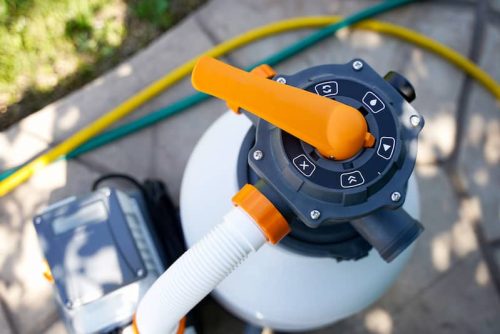Seasonal pool care is important in maintaining a sparkling, healthy swimming pool. Each season uniquely influences pool algae growth, with warm temperatures favoring green and yellow algae.
In this blog, you’ll learn how to prevent algae growth effectively understanding the role of pool water chemistry and pool filters in combating algae in your pool. Each step is crucial, whether removing plant debris in fall or managing chlorine levels in summer. As a pool owner, embrace this guide to get rid of pool algae and enjoy a clean, algae-free pool year-round.
Table of Contents
ToggleWhat is Pool Algae?
Several factors contribute to algae in pool growth. Key among them are imbalanced pool water chemistry, poor water circulation, and poor filtration. Green algae, black algae, and mustard algae are the most common pool algae strains requiring different algae treatment methods.
Causes of Algae Growth in Pools
Pool algae are simple organisms that thrive in swimming pools, turning the water into an unappealing green pool. They form when algae spores find a hospitable environment in your pool.
The Impact of Algae in Pool Health and Aesthetics
Algae can stain pool surfaces and slippery the swimming pool floor, posing safety risks. Green pool algae, for instance, can cause green water, ruining the aesthetic appeal of your pool. Moreover, algae blooms can feed pool algae, creating a cycle of growth that’s hard to break. Maintaining your pool’s water chemistry, using pool chemicals correctly, and employing pool cleaning tools like a pool brush is essential for pool maintenance to prevent algae and keep your pool inviting.
Spring Pool Care
As spring unfolds, it’s crucial to rejuvenate your swimming pool and prepare it for the warmer months. Spring pool care ensures your pool remains free from algae blooms and is ready for enjoyment.
Spring Cleaning: Preparing Your Pool After Winter
- Removing Debris and Cleaning the Pool: Begin by using a pool brush to scrub pool walls and floor. Clearing away leaves and debris prevents algae food sources from accumulating. Ensure your filtration system is free from clogs, maintaining proper water balance.
- Balancing the Water Chemistry: Test and adjust pool water chemistry. Ensure free chlorine levels are adequate to kill algae and control carbon dioxide levels.
Algae Prevention Strategies for Spring
- Regular Pool Monitoring: Frequently check your pool pump and pool filter to avoid poor circulation, a common cause of algae growth. Ensure a pool pump repair by professionals.
- Appropriate Algaecide Use: Introduce algae treatment chemicals only when necessary. Over-reliance on pond chemicals or specialty chemicals can disrupt the pool’s water chemistry, leading to future algae blooms. Use granular pool shock judiciously to eliminate algae, especially black pool algae and pink slime, at the early stage of algae growth.
Summer Pool Maintenance
Summer brings sunshine and fun but also challenges maintaining a swimming pool. Warmth and sunlight can accelerate algae bloom, demanding diligent pool care.
The Challenges of Algae in Summer
Increased temperatures and frequent use can lead to issues with pink algae and yellow pool algae. Algae bloom becomes more likely, necessitating proactive maintenance strategies.
Daily and Weekly Maintenance Tips
Pool Filtration and Circulation: Regularly check and clean your pool filters. Good circulation is essential to prevent dead algae from settling and algae bloom from forming.
Shock Treatment and Chemical Balance: Use shock treatments appropriately to maintain a clean and clear pool. Balancing chemicals like chlorine is vital to inhibit algae growth. Too little can lead to algae bloom, while too much can harm swimmers.

Enhancing Pool Enjoyment While Preventing Algae
Integrate swimming pool automation and pool cleaners into your routine. These tools can significantly reduce the workload and keep your pool inviting all summer. Clean and well-maintained pools are the best defense against algae, ensuring your pool remains a blissful oasis.
Fall Preparations
As the leaves turn, it’s time to adjust your pool care for the cooler fall weather. This season requires specific strategies to prevent algae and maintain pool health.
Transitioning Your Pool for Cooler Weather
- Decreasing Pool Usage and Adjusting Maintenance Routines : As you use your pool less, reduce the frequency of chemical treatments and cleaning. However, don’t neglect maintenance entirely; regular checks are still essential.
- Preparing for Leaves and Debris: Falling leaves can be a significant problem, contributing to algae growth. Regularly clean out leaves and debris to keep your pool clear and reduce the nutrients available for algae.
Algae Prevention Measures in Fall
As the weather cools, consider protecting your pool. A pool cover reduces the accumulation of debris and limits sunlight, which algae need to thrive.
In addition, monitor and adjust your pool’s chemical balance as the temperature changes. This adjustment is crucial to prevent algae growth in the changing fall conditions.
Winterizing Your Pool
Winter pool care is crucial to prevent algae and protect your investment. Cold weather doesn’t mean algae can’t grow; it just slows down. Proper winterization is key to ensuring a clean and clear pool for spring.
The Importance of Winter Pool Care for Algae Prevention
Algae can survive in cold water and bloom when temperatures rise. Maintaining your pool in winter reduces algae growth, saving you time and effort when warmer weather returns.
Steps for Properly Winterizing Your Pool
- Lower the water level below the skimmer and drain all equipment, including pumps, filters, and heaters. It prevents damage from freezing temperatures and reduces stagnant water where algae can grow.
- Apply a winter algaecide to control algae growth. Cover your swimming pool with a sturdy cover to keep out debris and limit light, making it harder for algae to proliferate.
Proactive winter care is essential for an algae-free pool, ensuring a hassle-free start to your next swimming season.
Proactive Pool Care For Algae Prevention

Embracing year-round pool maintenance is your best defense against troublesome algae. Regular care keeps your pool pristine and significantly reduces the likelihood of algae blooms. Consistent maintenance is key, whether it’s balancing chemicals, cleaning,pool repair, or seasonal adjustments. Don’t hesitate to seek help from Professional Aquatic Services for expert advice and support. Their expertise can be invaluable, especially when tackling persistent or complex pool issues.

